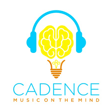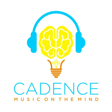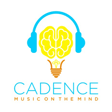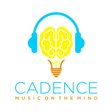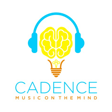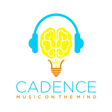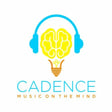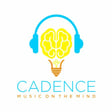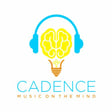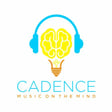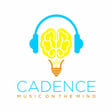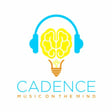Become a Creator today!Start creating today - Share your story with the world!
Start for free
00:00:00
00:00:01

Episode 01: What Is Music?
What is music? How would you define it? Does it defy definition? In this episode we try to get answers to those questions from from a pioneer in music cognition research, a musicologist, and an otolaryngologist who surgically restores hearing and studies the brain basis of musical improvisation. theensembleproject.com/cadence facebook.com/cadencepodcast twitter.com/cadencepodcast cadencemind@gmail.com Produced by Adam Isaak and Indre Viskontas. Music in this episode was provided by acclaimed New Zealand composer Rhian Sheehan from his album Stories From Elsewhere.
Transcript
What is Music?
00:00:00
Speaker
This episode and the creation of this podcast was generously sponsored by the Germanicos Foundation. I guess in a way music can be defined in the negative as it were. That's not music. That's noise or that's not music. It's speech or it's something else.
00:00:21
Speaker
Music is always mixed up in a tangle of practices. You might say it's always part of a particular social network, a particular set of cultural relations that makes it what it is. To me it's organised sound, and it's sound that's organised according to certain principles. Pitch, rhythm, harmony. It uses timbres, it has certain dynamics. And the purpose being, I think, to communicate something.
00:00:44
Speaker
We can differentiate music from other forms of communication by their characteristics. So, for example, we can distinguish speech from song in various ways. And they all indicate that language and music are intertwined.
00:01:03
Speaker
So what is music?
Exploring Music through Cadence Podcast
00:01:04
Speaker
How would you define it? Or does it defy definition? Does defining it take away some of its magic? These are the kinds of questions we're going to be exploring on this, the first season of Cadence. I'm Indre Viscontis. I'm a neuroscientist and a classically trained opera singer. And I've been struggling with this question of what can neuroscience tell us about music?
00:01:41
Speaker
Maybe it's because I'm a Libra. Or maybe it's because my dad was an engineer and my mom a conductor. Not the trained kind, the musical kind. But I've always been pulled in two seemingly opposite directions. I love the comforting rigor and rationality of science and the freedom and passion of music.
00:02:00
Speaker
So for most of my career, I kept these two sides separate, not wanting to tarnish my science with fluffy artsy thinking, and not wanting to sterilize my musical performances with too much reductionism.
00:02:14
Speaker
For the most part, I found academic articles on musical topics kind of boring and irrelevant from an artistic standpoint. I couldn't see how understanding sound waves in such detail would make me sing more effectively. Or the articles that did sound interesting tended not to be rigorous enough to pass my high scientific bar.
Music: A Study of Mind and Society
00:02:36
Speaker
But recently things have started to change.
00:02:39
Speaker
So I'm starting this podcast so that I can explore the intersection between music and science. Music is ubiquitous and diverse and powerful, and I'm excited to see just how much we can learn about the mind with music as the microscope.
00:03:00
Speaker
Music, in my opinion, is inherently social. Filling my living room with music immediately makes me feel less lonely and more connected, even when I want to be alone. And I use music to communicate thoughts and feelings that I don't have words for. So I don't think this journey would be as interesting or as fruitful if I were going it alone.
00:03:23
Speaker
The voices you heard at the top of the show are ones that will return again and again throughout this first season. You heard from Diana Deutsch, she's a pioneer in music cognition research at the University of California in San Diego, Nicholas Mathew, a musicologist at the University of California in Berkeley, and Charles Lim, an otolaryngologist who studies the brain basis of musical improvisation and who surgically restores hearing in people who are deaf at the University of California in San Francisco.
00:03:53
Speaker
three very different perspectives whose thoughts will be joined by many others from many different walks of life. You'll hear from scientists, musicians, musicologists, musicians, composers, and many others. In each episode, we'll delve deeply into a topic, but over the course of the season, we'll also be following some stories, checking in with regular guests.
00:04:16
Speaker
Like some of my musician friends who are about to release their first album or who are struggling with things like dystonia, my two-year-old son who's in a critical period of auditory learning, I'm going to try to train him to have perfect pitch.
00:04:29
Speaker
and patients who are struggling to make sense of sound having lived without it for many years. But first, let's get back to the questions I posed at the top of the show.
How is Music Different from Speech?
00:04:39
Speaker
How should we go about defining music? After all, science begins with definitions. When I asked Diana Deutsch how she would define music, here's what she said.
00:04:51
Speaker
We can differentiate music from other forms of communication by their characteristics. So for example, we can distinguish speech from song in various ways. So for example, vowels in song tend to be flat and so don't wobble around very much, whereas speech instead consists of gliding tones.
00:05:19
Speaker
and vowels in song tell them to be longer than the vowels of speech and so on. So in general we can tell whether we're hearing speech or whether we're hearing song, though there are a number of
00:05:35
Speaker
types of communication that fall at the boundary between the two. We have religious chants, we have incantations, there's opera recitative, and then there's tone languages, whistle languages, and of course, much rap music. And they all indicate that language and music are intertwined.
00:05:55
Speaker
And yet there are a lot of people who would say rap music isn't music or, you know, opera recitative, well, that's not music. The music comes in the arias. And it seems that people sort of have an emotional reaction and have the sense that music is something other. I guess in a way, music can be defined in the negative as it were better.
00:06:19
Speaker
As you say, you say that that's not music, that's noise, or that's not music, it's speech, or it's something else. It sounds as though people are expressing their view of what they think music is. And of course different people have different views.
00:06:42
Speaker
As a music cognition researcher, Dana Deutsch has thought a lot about the cognitive aspects, obviously, of music. But what about the physical aspects? That's where I wanted to turn to Charles Lim.
Brain's Role in Music Perception
00:06:55
Speaker
Charles Lim is an otolaryngologist. He's a surgeon. He's also a musician himself and an aficionado of musical instruments, among other things.
00:07:04
Speaker
And he's really passionate about understanding how it is that the brain processes music. And his opinion is not really in the ear, it's in the brain. I guess for me I start with a simple definition because I think all of the more complex definitions don't work that well. To me it's organized sound, and it's sound that's organized according to certain principles, pitch, rhythm, harmony. It uses timbres, it has certain dynamics. And the purpose being, I think, to communicate something.
00:07:32
Speaker
So I understand if a music cognition researcher and an otolaryngologist might not want to commit to a specific definition, but what about the musicologists? Surely they would figure out a way to use language to define something that most of us find indefinable. I mean, after all, isn't that what they spend most of their time doing?
00:07:55
Speaker
And I didn't want to just ask the simple question of how you define music. Instead, I wanted to ask Nicholas Matthew, who's a musicologist, whom I went to interview at the University of California in Berkeley, if I gave him two sound files, how would he decide whether one of them is music and the other isn't?
Is Music Contextual?
00:08:13
Speaker
So I guess I get to be the annoying professor and say that the question is probably not the right one. Because it assumes that you could decide what music is based on properties of the object, properties of the sound. Whereas anyone who knows anything about the history of art knows that Duchamp took a urinal out of one context and put it in another and suddenly we contemplated it very differently. We suddenly were able to see it as a work of art rather than something that you go to the lavatory in.
00:08:42
Speaker
And in fact if you were to try and decide whether it was based on intrinsic properties of the work itself you wouldn't be able to. So really the question is less about what music is or what a sounding object is and rather what are we using it for and where is it.
00:09:03
Speaker
That kind of blew my mind, this idea that we can't decide whether something is music based on the sound it makes. Of course I know that sound really is a perceptual thing, and it's in our brains. After all, the correct answer to the question, if a tree falls in the forest and there's no one there to hear it doesn't make a sound,
00:09:24
Speaker
is no, because sound is something that we need a brain in order to create. You can have air pressure changes, you can have sound waves, but sound itself is in the brain. But I still thought that at least if we have a brain and it processes sound in a certain way, we can still agree that it is some kind of music.
00:09:45
Speaker
In the West, we have lots of things that are like music and lots of practices that are like music, but they haven't always been that way. You look in other cultures and you find that some don't even distinguish particular sets of sound as being music in the same way that we do. Does this mean that my entire quest of trying to understand music in the brain is misguided? Is Matthew suggesting that in fact
00:10:14
Speaker
I'm just looking at this as a 21st century phenomenon that's very specific even to the geographic and cultural place in which I live and that my definition of music is so culturally specific so as not to tell me anything universal. If that's the case, then science really isn't the tool to use since what science does is try to extract general principles.
00:10:38
Speaker
But I just don't know that that's really the end of the line. So I wanted to go back to Dana Deutsch and ask her about the universal aspects of music. Maybe as a music cognition researcher, she sees some universality in music that people who are more entrenched in the idea of music as a cultural phenomenon might not have observed.
Universal Musical Concepts
00:11:05
Speaker
Well, there's things like octave equivalence, of course, and the equivalence of intervals and chords, which the fact that you can transpose music from one key to another or more generally from one pitch range to another is a cross-cultural universal. Meter seems to be a cross-cultural universal, although there are, of course, some examples where you don't have meter and similarly with rhythm.
00:11:32
Speaker
So there is a set of musical universals or at least quasi-universals that one can point to. All right, so we haven't gotten very far using the definition as our tool. What about measuring musicality or musical ability?
00:11:50
Speaker
That was another direction that I wanted to go in because, of course, we seem to call one person or another more musical. We have ways of measuring musicianship and musicality in different conservatories. So how is it that scientists might measure a person's musicality? Because after all, we hear all kinds of headlines suggesting that some gene or another has been found that distinguishes a musical person from an A musical person.
00:12:19
Speaker
So how do cognitive psychologists test for musical ability? It's really a difficult question. I don't really know of any test that works that well at present. It is difficult because you have, on the one hand, if you want to test people regardless of musical ability, you end up defaulting to things like pitch discrimination and so on.
00:12:47
Speaker
On the other hand, when you have higher-level things, you have this problem with amount of musical training. Also, age of onset of musical training is very important in how well people perform musically. So, these are tests of performance on tests, but I know that you're getting at something much more basic than that. You're really wanting to get at artistry, which is very, very difficult.
00:13:17
Speaker
And that's why Diana Deutsch is a giant in the field, and I'm just a beginner. She's exactly right. The interesting question is how can we define artistry? And what can we learn about our own minds by dissecting artistry as it relates to music?
00:13:32
Speaker
Musical preference is so subjective, and yet many of us can agree that some artists are better than others, whether we're talking about technical skills or the ability to engage with an audience, or the je ne sais quoi that we can detect using some kind of spidey sense. Clearly there's still work to do on that one.
00:13:50
Speaker
So the next step in my journey was to try to get a handle on what we know about musical artistry and how a great musician uses her brain while performing.
Jazz and Improvisation in the Brain
00:13:58
Speaker
One approach is to look at spontaneous creation of music in the neuromaging scanner. And some people argue that jazz improv is the perfect test. So that brought me back to Charles Lim, whose work on improv in the brain is really well respected and well known for good reason.
00:14:16
Speaker
Well, I guess the first thing I would say is that it is possible. It's possible to study high-level jazz improvisation or any improvisation if you have, I would call it, we use the term ecologically valid paradigm, but what we really mean by that is if you use a method that's sort of faithful to the art itself. Because science labs are not the most conducive environments or contexts to genuine artistic creation. And so I think that working with a musician or an artist that is exceptional at
00:14:45
Speaker
what they do really makes it easier because a highly trained jazz expert whose bread and butter is amazing improvisation doesn't really find it that hard to improvise when they're getting their brain scanned, for example.
00:14:56
Speaker
And so we found that when a musician is improvising, their brain changes a great deal. There's a huge functional change between the improvising creative brain and the memorizer rote brain. And I think that the main changes are in what we call the prefrontal cortex of the brain. And so that's the part of the brain that really separates humans from animals.
00:15:15
Speaker
One way to describe what we found is that we have a generalized shutdown of conscious self-monitoring processes during creative improvisation and then in some cases an increase or heightened activity in these autobiographical self-reflective areas.
00:15:32
Speaker
That's a lot to think about, and we are near the end of episode one. So I'll come back to some of these ideas later in the season, and we'll look at some of the other studies that Charles has done on improvisation that can tell us a little bit more about what's different in jazz improv, what's different when people have different emotions that they're trying to portray, and even how jazz improv and classically trained musicians improvisations have different neural signatures.
00:16:00
Speaker
I want to go back to a poster presentation that I saw at the 2015 Society for Music, Perception, and Cognition meeting in Nashville. There, I met a student who was presenting some work on jazz improvisation, and unlike the idea that most of us have, you know, that it's all about spontaneity and online creation, his work suggests that there are definite rules that can distinguish good from bad improvisations, and they're simpler than you might think. Here's Nat Condes Schulz. You'll hear the buzz of the conference in the background.
00:16:30
Speaker
When we think about improvisation as opposed to composition, so in improvisation you're creating music on the spot, you're inventing it, whereas in composition you're playing something you've already memorized kind of idea. We tend to focus on how those are different creative processes. It's a different way of creating music. What I'm focusing on here is how is the music that we create actually different? And if you're listening to somebody else, can you tell are they improvising or are they composed? Are they coming out different?
00:16:55
Speaker
And what I've been looking at is that they are different and actually there's stylistic reasons. So one of the first things I've seen is the improvisation goes much faster. When you're improvising, people like to go fast. There's a lot of them really fast, kind of showing off, kind of speedy. You think of guitar soloists just going crazy, playing tons of notes. That's the first sign that this is an improvisation. It's not something that was pre-composed.
00:17:17
Speaker
So for someone who's a bit of a jazz newbie, why is improv considered so much more interesting or cooler than a performance by someone who has perfected a piece already written?
00:17:28
Speaker
Why should it matter? Well, one of Nat's findings was that the faster the improvised passage was played, the more impressive people found it. I think part of what people find really appealing about improvisation is it seems so amazingly magical how difficult it is, you know. It's just you watch them improvise and it's like, wow, it's so amazing that they can just create this stuff. So I think when we kind of go faster, we're kind of showing you not only can we do this, we're going really fast. And that's just sort of enhancing this sort of sense of the virtuosity of it.
00:17:57
Speaker
Okay, so freedom. Freedom is important. We can compose that in though, and even if it's fake, we can still sound impressive and spontaneous. He even found that you can take a repeated phrase, and if it's played slowly, people think that it's composed and then memorized and less interesting, but you take the same note pattern, speed it up a lot, and all of a sudden people think it's being created on the spot, and they find it more impressive.
00:18:25
Speaker
There's really a continuum between purely improvisation and purely composed. And when we're improvising, we're often in the middle ground somewhere. Kind of my takeaway is that that's not really what matters, whether it really is or isn't. What matters is whether it sounds like it is to us. Because if it sounds like improvise, it just makes it seem more passionate and more interesting and more immediate in a way that composition doesn't.
00:18:51
Speaker
Okay, so even improvisation is not a pure measure of musical artistry. But we do like to feel as though we're in the process of watching someone create music on the fly. We're impressed when we feel like we are present when it happens. And that brings me back to the question that led me on this journey in the first place.
Music as Social Connection
00:19:10
Speaker
How does music connect people?
00:19:14
Speaker
Why is it more impressive and more amazing to be in the presence of someone who is creating music on the fly than to just be at home listening to a recording? After all, music is a universal across cultures and civilizations. It can cause riots, change minds, comfort suffering. It's part of the vast majority of our rituals. It's effective social glue.
00:19:45
Speaker
Thank you for listening to this first episode of Cadence. You can find us online at the ensembleproject.com slash Cadence, at Facebook slash Cadence podcast, and on Twitter at Cadence podcast. You can also get in touch with us at cadencemind at gmail.com. Cadence is produced by Adam Isaac and me in Draviscontas. I also created and write the show. The music in this episode was provided for us by acclaimed New Zealand composer, Rian Sheehan, from his album Stories from Elsewhere.
00:20:12
Speaker
Check him out at reinshian.com. You can find me on Twitter at Andre this. Join us in two weeks for our next episode in which we continue our exploration into what music tells us about the mind. Here's a sample of what you'll hear. Suddenly it appeared to me that a strange woman had entered the room and was singing.
00:20:35
Speaker
But they sometimes behave so strangely. They sometimes behave so strangely. Sometimes behave so strangely. After glancing around and finding no one there, I realized that I was hearing my own voice.
00:20:51
Speaker
repeatedly producing this phrase but now instead of hearing speech it seemed to me that a sung melody was repeatedly spilling out of the loudspeaker so the phrase had perceptually morphed from speech into song by the simple process of repetition
